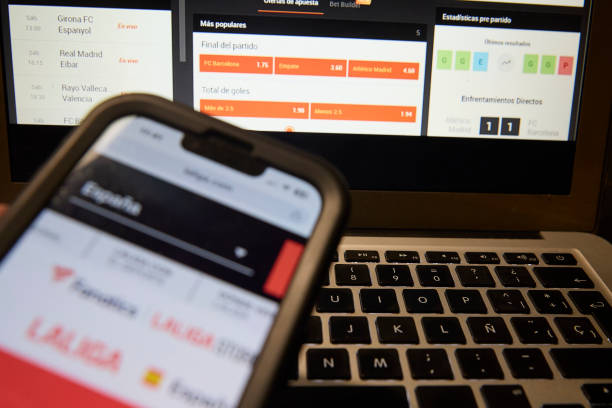
Online betting sites have fundamentally reshaped the global gambling landscape, turning what was once a physical, cash-driven experience into a fast, data-rich, and highly personalized digital ecosystem. The influence of digital technology on the betting industry has not only enhanced user experience but also redefined market dynamics, security standards, and business scalability. This in-depth story explores how online betting sites have evolved and the powerful role that technology has played in their rise.
📱 Online Betting Sites: The Digital Shift That Changed Everything
Online betting sites have grown rapidly since the mid-1990s, driven by internet penetration, smartphone adoption, and shifting consumer behavior. What began with simple websites offering fixed odds has now evolved into sophisticated platforms with live betting, virtual sports, AI-powered predictions, and seamless digital payments.

In the first quarter of 2025 alone, global revenue from online betting sites exceeded $50 billion, confirming the sector’s explosive growth and ongoing technological innovation.
1. 🌐 The Internet Revolution and Birth of Online Betting Sites
The emergence of the internet in the 1990s gave rise to the first online betting sites, such as Intertops, which launched the first online sportsbook in 1996.
- Impact: Bettors could place wagers remotely, 24/7
- Reach: Global events became accessible from any location
- Scale: Bookmakers expanded rapidly without needing physical outlets
This marked the beginning of a new era in the betting industry, eliminating geographical and operational limitations.
2. 📲 Mobile Betting: The Game-Changer for Online Betting Sites
The introduction of smartphones and mobile apps propelled online betting sites into mainstream popularity. Today, more than 75% of betting activity globally happens on mobile devices.
- Features: In-play betting, live streams, one-click betting, instant cash-outs
- Benefits: Portability, speed, and convenience
- Innovation: Face ID logins, push alerts for odds, geolocation betting

Mobile technology made betting more immersive and accessible than ever.
3. 🎮 Rise of Live and In-Play Betting Markets
Digital platforms enabled the integration of real-time data feeds, leading to the rise of live or in-play betting. This transformed how users engage with events.
- Dynamic Odds: Change every second based on match activity
- User Engagement: Increased dwell time and bet frequency
- Tech Role: Low-latency streaming and automated algorithms
Online betting sites now offer thousands of in-play markets across sports, giving users the power to bet while watching events unfold.
4. 🤖 AI and Machine Learning: The Brains Behind Smart Betting
Online betting sites have adopted artificial intelligence and machine learning to analyze massive data sets and personalize user experiences.
- Odds Compilation: Automated and dynamic
- Risk Management: Real-time detection of suspicious activity
- Personalization: Custom offers, betting suggestions, and behavioral insights
AI ensures that platforms are not only safer but also more responsive to user preferences.

5. 🔐 Blockchain and Secure Payment Gateways
Security and transparency are critical in online betting sites, and digital technology has responded with innovations in payment and fraud prevention.
- Blockchain: Transparent transaction logs, reduced chargebacks
- eWallets and Crypto: Faster, borderless payments
- KYC/AML Tech: Automated identity verification and anti-fraud systems
From PayPal to Bitcoin, bettors can fund accounts securely, while sites meet strict compliance protocols.
6. 📊 Big Data and Customer Analytics
Every action taken by users on online betting sites generates data. Platforms now leverage big data to optimize everything from odds-making to retention campaigns.
- Real-Time Analytics: Player tracking, bet patterns
- Segmentation: Group users by risk level or preference
- Marketing Automation: Timely promotions and win-back offers
Data has become one of the most valuable assets in the betting business.

7. 🧠 UX & Personalization in Online Betting Sites
One of the biggest differentiators among online betting sites is user experience (UX). Smart interfaces and personalized dashboards are designed to keep users engaged and satisfied.
- Custom Bet Builders
- Suggested Bets Based on Behavior
- Intuitive Interfaces and Dark Mode Options
These UX improvements, powered by digital tech, have led to higher retention and lower bounce rates across platforms.
8. 🎯 Regulatory Tech (RegTech) and Responsible Gambling Tools
As governments tighten gambling regulations, online betting sites use RegTech to maintain compliance and promote responsible gambling.
- Self-Exclusion Tools
- Deposit/Loss Limits
- Pop-up Warnings Based on Behavior
- Automated Reporting to Gambling Commissions
Digital technology ensures these practices are integrated in real-time and monitored consistently.

🌍 Global Impact of Online Betting Sites
Thanks to digital tools, online betting sites have grown exponentially across key markets:
- Europe: Mature, highly regulated markets like the UK and Italy
- Africa: Mobile-first adoption, especially in Nigeria, Kenya, and South Africa
- Asia: Massive potential despite regulatory hurdles
- US: Post-2018 explosion after PASPA repeal, led by NFL/NBA betting
Localization, language support, and regional payment integrations have also fueled the rise of online betting sites worldwide.
🚀 What the Future Holds for Online Betting Sites
As technology evolves, so will online betting sites. Key future trends include:
- Voice-Powered Betting via Smart Devices
- Augmented Reality (AR) Betting Environments
- Predictive Betting Using AI-Powered Models
- Web3 Integration and Decentralized Betting Platforms
- Esports and Micro-Betting (per pass, foul, or play)
The next generation of betting platforms will be more immersive, secure, and customized than ever before.
SUGGESTED FOR YOU
🧾 Final Thoughts on Online Betting Sites and Tech Evolution
The journey of online betting sites from dial-up platforms to AI-driven powerhouses showcases how digital technology has redefined an entire industry. With every new device, algorithm, and interface, these platforms become more engaging, efficient, and user-centric.
For users, it means faster access, smarter bets, and safer experiences. For businesses, it means scalability, global reach, and competitive edge. And for regulators, it offers tools to ensure fairness, transparency, and accountability.









